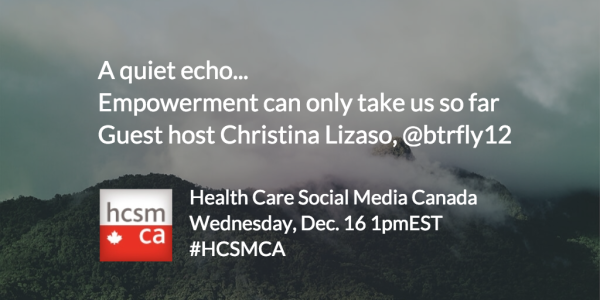As things currently stand, the patient or someone on their behalf needs to be that patient’s advocate and actively participate in the care plan. Absent this, things can go very bad, very quickly. So when patients and families are in the midst of a crisis and not at their best, they are compelled to become researchers, negotiators, scribes and more.
Take my mom. She is a cancer survivor, cared for my dad through cancer and a stroke, and now cares for her elderly husband. She estimates 50-60 percent of her waking hours are now dedicated to being the healthcare CEO of her own and her husband’s health. Her health record keeping alone includes: a one-page sheet for each doctor’s visit upon which she takes notes (on her copy) and then types up following the meeting, a two page health summary with all contact information for her and for her husband that is regularly updated and kept on her person at all times, and a spreadsheet with a tab detailing discontinued treatments and a tab detailing each “major health event”. She spends at least an hour preparing for each doctor’s appointment and then spends time after documenting. She keeps up with this labor intensive system because she has seen what happens when she doesn’t have her own system. She has also learned a lot about when and how to speak up.
What percent of patients have an educated, experienced caregiver who can spend as much time as needed advocating for them?
To manage – physically and emotionally – patients and families seek out each other in digital patient communities where they share tips and tricks for for navigating the system and the impacts of disease. As feelings of isolation subside and stories are shared, patients and families do become more educated, equipped and empowered. And it has been good to see that more organizations are seeing the need to help empower more people in their health.
Yet there are plenty of stories of those who know the system – those who would consider themselves empowered – and still run into hurdles they can’t overcome.
The need for active, unwavering engagement is the reality, but how heavy a burden is this? What can be done differently? Done better? And what role do health systems have to play for those who can’t or don’t want to be “ePatients”?
So yes, let’s collaborate, partner, and have shared decision making for those who desire it – be people in this process – but let’s also figure out how to lighten the load in the first place.
Guiding our discussion on Wednesday, December 16 at 1pm ET, let’s ask:
- T1: What keeps patients from being empowered in their health?
- T2: What responsibility falls back on those providing care to help patients navigate the broken system?
- T3: Empowerment can only take healthcare so far. How can “ePatients” be better utilized to improve the systems?
- T3b: How can online social tools support utilizing ePatients and patient input?
- T4: How might people who can’t or don’t want to be “ePatients” be supported? And by whom? The system, providers, patient peers
Author’s note:
I am deeply honored to be hosting a #hcsmca chat. In 2011, Colleen was the very first person that I ever interacted with on twitter. By following her after that interaction, I learned about the power of twitter chats. Later, with #hcsmca as an amazing example, I co-founded the #gyncsm community and today I also moderate #patientchat. My twitter world has come full circle and I am indebted to Colleen and to the #hcsmca community.
Here’s how patients can take a larger part in their own care by Suzanne Allard Levingston, The Washington Post https://www.washingtonpost.com/national/health-science/heres-how-patients-can-take-a-larger-part-in-their-own-care/2015/11/30/e4657544-6ad2-11e5-b31c-d80d62b53e28_story.html
From patient centered to people powered: autonomy on the rise by @ePatientDave http://www.bmj.com/content/350/bmj.h148
Why We Don’t Want to Be Our Own Patient Advocates by Barbara Jacoby, @letlifehappen http://breastcancer.about.com/od/supportineveryway/fl/Why-We-Dont-Want-to-Be-Our-Own-Patient-Advocates.htm
THE EMPOWERED WOMAN WHO COULDN’T BE AN EMPOWERED PATIENT by Kathy Kastner, @KathyKastner https://medium.com/@MayoInnovation/the-empowered-woman-who-couldn-t-be-an-empowered-patient-950d0f1c6d79#.awci5dj7a
Is being an ePatient sometimes a disadvantage? by Michael Seres, @mjseres http://beingapatient.blogspot.com/2015/10/is-being-epatient-sometimes-disadvantage.html
My Mother’s Scrap of Paper by Linda Stotsky, @EMRAnswers https://www.linkedin.com/pulse/my-mothers-scrap-paper-linda-stotsky
A Doctor at His Daughter’s Hospital Bed http://www.nytimes.com/2015/09/06/opinion/sunday/a-doctor-at-his-daughters-hospital-bed.html
Filed under: Guest moderator post, hcsmca, Participatory Medicine Tagged: Christina Lizaso, empowered, epatient
